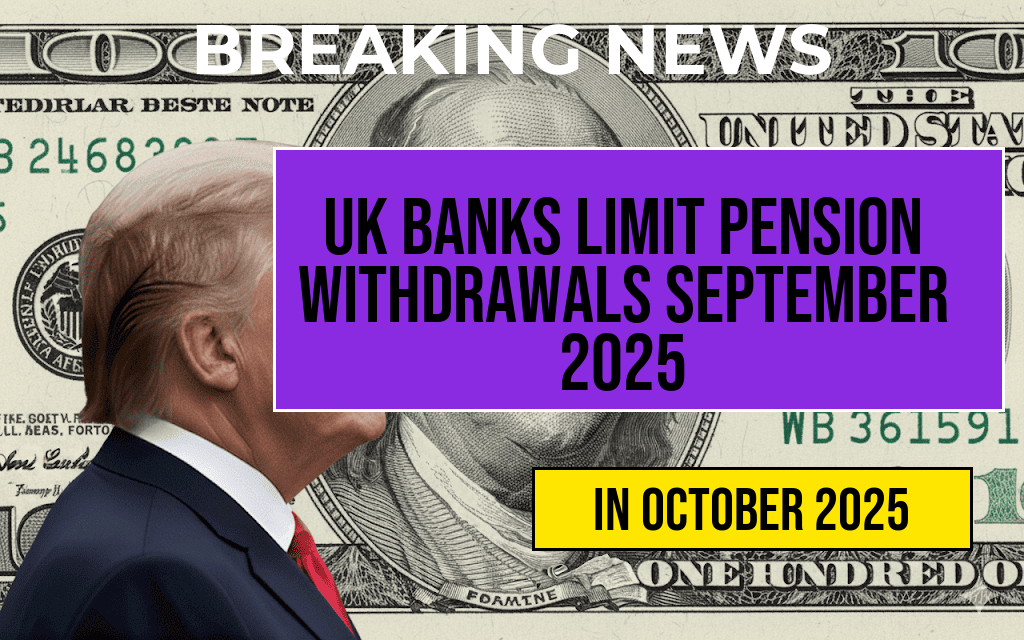British banks are set to implement new withdrawal limits for pensioners starting September 27, 2025, marking a significant shift in how older account holders access their savings. The policy, announced by several major financial institutions, aims to curb large-scale cash withdrawals amid rising concerns over financial stability and the increasing popularity of digital banking. While the move has sparked debate over its impact on retirees’ financial freedom, banking officials emphasize that the limits are designed to ensure sustainable banking practices and protect the broader economy. Pensioners relying on cash transactions for daily expenses will need to adapt to these changes, which could reshape withdrawal habits across the UK’s aging population.
Background and Rationale Behind the New Limits
The decision to introduce withdrawal caps stems from ongoing efforts to modernize banking regulations and prevent potential financial disruptions. Over the past few years, the UK has seen a surge in online banking use, with cash withdrawals declining sharply. However, a subset of pensioners continues to depend heavily on physical cash, often due to limited digital literacy or personal preference. Banks argue that unrestricted cash withdrawals pose risks, including money laundering, fraud, and operational strain on cash logistics. As a result, financial authorities have mandated stricter controls, with the new limits set to be phased in over the coming months.
Details of the Withdrawal Limits
| Type of Account | Daily Limit | Monthly Limit |
|---|---|---|
| Standard Pensioner Accounts | £500 | £2,000 |
| Premium Pensioner Accounts | £1,000 | £4,000 |
The limits are designed to be flexible, with some banks offering exemptions for specific circumstances, such as medical emergencies or severe financial hardship. Customers are advised to contact their banking providers directly for personalized arrangements.
Impact on Pensioners and Banking Services
Reactions from the Public and Advocacy Groups
Many pensioners and advocacy organizations have expressed concern over the restrictions, fearing they could hinder access to cash for essential needs. UK banking laws historically prioritize customer access, but recent regulatory shifts aim to balance convenience with security. Some critics argue that the limits could disproportionately affect low-income retirees who rely more heavily on cash transactions. Conversely, supporters claim that these measures will reduce illicit activities and promote the transition to digital payments.
Banking Industry Perspective
Major banks such as Barclays, HSBC, and Lloyds have issued statements confirming the new withdrawal policies. They highlight that the limits are part of broader efforts to modernize banking infrastructure and improve financial safety. Banks also note that the restrictions are temporary and subject to review, depending on the evolving economic landscape and technological advancements. A spokesperson from the Bank of England emphasized that such measures are common in global banking systems, especially as countries adapt to digital economies.
Potential Alternatives and Recommendations for Pensioners
With the introduction of withdrawal caps, pensioners are encouraged to explore alternative financial solutions. These include using digital banking services, setting up direct debits, or utilizing banking apps for everyday transactions. For those uncomfortable with technology, local branches may offer assistance or tailored services to ensure access to necessary funds. Financial advisors recommend planning withdrawals ahead of time and consolidating cash needs to avoid inconvenience. Additionally, pensioners should consider establishing accounts that offer higher withdrawal limits or specialized services designed for seniors.
Resources for Assistance and Further Information
- Money Advice Service: Provides guidance on managing finances and understanding banking changes. Visit here
- Citizens Advice: Offers support for consumers facing banking restrictions and financial challenges. Learn more
- Bank of England: Regulators overseeing banking practices and policies. Official site
As the UK banking landscape shifts toward digital integration, older adults are urged to stay informed about upcoming policy changes. While the new withdrawal limits aim to safeguard the financial system, they also underscore the importance of adapting financial habits to ensure continued access to funds. Pensioners and their families should consult with banking representatives to understand how best to navigate these adjustments while maintaining financial stability.
Frequently Asked Questions
What are the new withdrawal limits introduced by UK banks starting September 27, 2025?
The UK banks are implementing new withdrawal limits for pensioners, which will cap the amount they can withdraw from their pension funds starting September 27, 2025. These limits are designed to regulate pension access and ensure financial stability.
Why are UK banks introducing these new withdrawal limits?
The UK banks aim to promote responsible pension management and protect pensioners from potential financial risks. The new withdrawal limits are part of broader reforms to ensure sustainable access to pension funds in the long term.
Who will be affected by the new withdrawal limits?
The new withdrawal limits primarily affect pensioners who access their pension funds through UK banks. Any pensioners planning to withdraw large sums from their pensions after September 27, 2025, should be aware of these new restrictions.
Are there any exceptions to the withdrawal limits for pensioners?
Some exceptions may apply, such as urgent medical expenses or other exceptional circumstances. Pensioners are advised to consult with their bank or financial advisor to understand if their situation qualifies for an exception under the new rules.
How can pensioners prepare for these withdrawal limit changes?
Pensioners should review their current pension plans and consult with financial advisors to plan their withdrawals accordingly. It’s also recommended to stay informed about upcoming regulations and consider alternative options to manage their funds effectively before September 27, 2025.

Leave a Reply